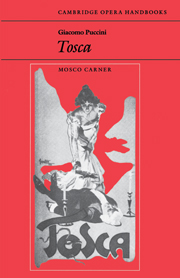Book contents
- Frontmatter
- General preface
- Contents
- List of illustrations
- 1 Sardou and his La Tosca
- 2 Naturalism in opera: verismo
- 3 Genesis of Tosca
- 4 Synopsis
- 5 Play and opera: a comparison
- 6 First production and critical history
- 7 Interpretation: some reflections
- 8 Style and technique
- 9 Musical and dramatic structure
- 10 Analysis: Act I in perspective
- 11 Tosca in the United States
- Notes
- Select bibliography
- Discography by Malcolm Walker
- Index
5 - Play and opera: a comparison
Published online by Cambridge University Press: 04 August 2010
- Frontmatter
- General preface
- Contents
- List of illustrations
- 1 Sardou and his La Tosca
- 2 Naturalism in opera: verismo
- 3 Genesis of Tosca
- 4 Synopsis
- 5 Play and opera: a comparison
- 6 First production and critical history
- 7 Interpretation: some reflections
- 8 Style and technique
- 9 Musical and dramatic structure
- 10 Analysis: Act I in perspective
- 11 Tosca in the United States
- Notes
- Select bibliography
- Discography by Malcolm Walker
- Index
Summary
To recast a play or a novel into an effective opera text requires a special technique. Yet, as Ernest Newman wrote some 30 years ago, while there are textbooks for composers, conductors, instrumentalists and singers, there is no manual for the art of the librettist. More recently Gary Schmidgall has singled out certain features in literary sources on which opera thrives, such as passionate force, lyrical expression, individuality and vigour of characters, direction of impact and simplicity. Schmidgall, however, only refers to what might be called the ‘opera-genic’ in literary sources – he does not touch on the specific method a librettist employs in translating a literary text into a viable opera text. His work appears to be entirely empirical. The good librettist is born, not made. His instinct, supported by ingenuity and technical skill, will guide him in the deployment and balancing of those features listed by Schmidgall. At the same time he must be flexible and adaptable enough to accommodate himself to the special musico-dramatic requirements of a given composer. Thus, a librettist employed by one composer will approach his task, so far as the details of his adaptation are concerned, from an angle different from that of a librettist working for another composer. Hofmannsthal could never have been the ‘right’ poet for Puccini, while Illica and Giacosa could never have been the right collaborators for Richard Strauss.
- Type
- Chapter
- Information
- Giacomo Puccini: Tosca , pp. 46 - 63Publisher: Cambridge University PressPrint publication year: 1985



